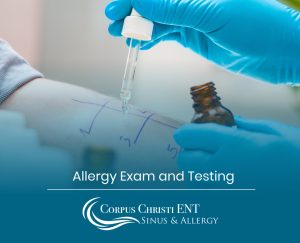
Our office will perform a physical exam and comprehensive history.
Allergy testing may be needed to determine if the symptoms are an actual allergy or caused by other problems. For example, eating contaminated food (food poisoning) may cause symptoms similar to food allergies. Some medications (such as aspirin and ampicillin) can produce non-allergic reactions, including rashes.
Skin testing is the most common method of allergy testing. One type of skin testing is the prick test. It involves placing a small amount of the suspected allergy-causing substances on the skin, and then slightly pricking the area so the substance moves under the skin. The skin is closely watched for signs of a reaction, which include swelling and redness. Our office performs skin testing in patients over the age of 5 years.
Blood tests can measure the levels of specific allergy-related substances, specifically one called immunoglobulin E (IgE).
In some cases, the doctor may tell you to avoid certain items to see if you get better, or to use suspected items to see if you feel worse. This is called “use or elimination testing.” This is often used to check for food or medication allergies.
Dr. Weiss may also check your reaction to physical triggers by apply heat, cold, or other stimulation to your body and watching for an allergic response.
Sometimes, a suspected allergen is dissolved and dropped into the lower eyelid to check for an allergic reaction.
Treatment
Testing, diagnosis, and both medical and immunotherapy (SCIT traditional shots) and SLIT (sublingual drops) treatments for children and adults with allergies.
Severe allergic reactions (anaphylaxis) require treatment with a medicine called epinephrine, which can be life saving when immediately given.
The best way to reduce symptoms is to try and avoid what causes your allergies in the first place. This is especially important for food and drug allergies.There are several types of medications available to prevent and treat allergies. Which medicine your doctor recommends depends on the type and severity of your symptoms, your age, and overall health.
Specific illnesses that are caused by allergies (such as asthma, hay fever, and eczema) may require other treatments.
Allergy shots (slit subcutaneous immunotherapy)
Allergy shots (immunotherapy) are occasionally recommended if the allergen cannot be avoided and symptoms are hard to control. Allergy shots keep your body from over-reacting to the allergen. Regular injections of the allergen are given, with each dose slightly larger than the previous dose until a maximum dose is reached. They do not work for everybody and require frequent doctor’s visits.
Allergy drops (slit sublingual immunotherapy)
Allergy drop treatment works similar to shots by delivering a slowly increasing dose of physician-prescribed antigen that, over time, builds the body’s tolerance. The difference is that the drops are placed under the tongue and affect the immune system through very specialized cells found under the tongue. Research shows these cells are a friendlier and effective route for long-term desensitization, making it an ideal option for patients who aren’t candidates for shots. Patients take allergy drops each day for three to five years.